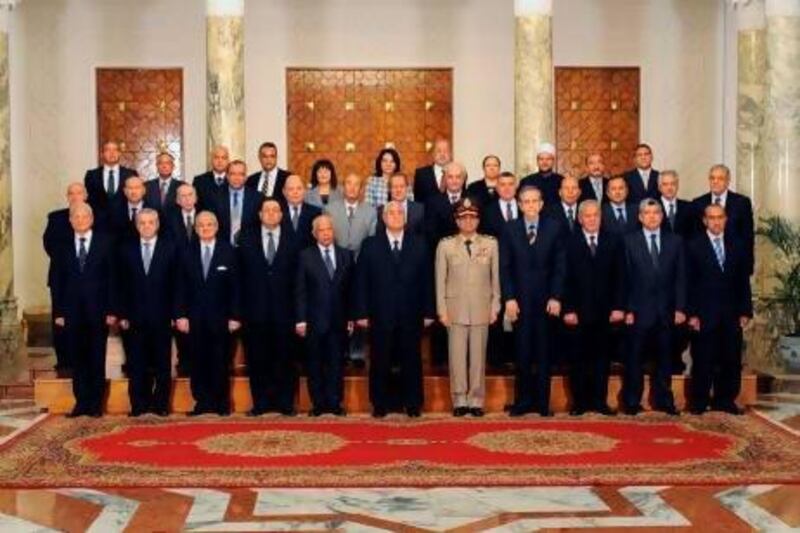CAIRO // Egypt's interim government was sworn in yesterday, two weeks after the military removed Mohammed Morsi's administration and a day after deadly clashes between the security forces and the supporters of the former president.
The military chief, Abdel Fattah El Sisi, was appointed first deputy prime minister and minister of defence in the 35-member cabinet headed by the liberal economist Hazem El Beblawi.
The Muslim Brotherhood, where Mr Morsi is a former deputy leader, has refused the entreaties of the interim president, Adly Mansour, to join his government and take part in the political transition. None of the newly appointed ministers are affiliated to any Islamist party or movement, with the ultra-conservative Al Nour party, which initially supported Mr Morsi's removal, also rejecting calls to participate in the new government.
"We don't recognise its legitimacy or its authority," the Brotherhood spokesman, Gehad El Haddad, said yesterday.
The Brotherhood has said its supporters would remain in the streets until the legitimate president was reinstated.
The new government is more inclusive than the one it replaces. Women have a higher profile, with three ministries - including the powerful information and health ministries. The Cabinet also includes two Christians, including one of the three women, Environment Minister Laila Rashed Iskander.
A week of relative calm was shattered on Monday night when seven people were killed and more than 260 injured in clashes between supporters of Mr Morsi and opponents of the deposed president and police.
It was unclear how the clashes in Cairo started. Anti-Morsi groups blamed "terrorists" for attacking police, while the Muslim Brotherhood's Freedom and Justice party said it was evidence of attempts to end their peaceful demonstrations with force.
The ministry of health reported that two of the victims were killed on a bridge in central Cairo and five near a pro-Morsi sit-in at Cairo University in Giza. The police arrested more than 400 people during and after the fighting.
It was the worst violence since the military opened fire on Mr Morsi's supporters on July 8, killing more than 50 people in an incident that is hotly contested by the two sides. The Muslim Brotherhood called it an unprovoked "massacre", while a military spokesman insisted that troops used deadly force only after they were attacked by militants armed with guns.
At least three of the dead were from the army and police.
The latest violence threatens to overshadow the interim government's efforts to start a reconciliation initiative and to revive the economy more than two weeks after Mr Morsi was removed from office by the military after days of angry demonstrations against his government.
Before Monday night's clashes, Mr El Beblawi had been making progress in establishing a new government and restoring stability to Egypt's streets.
Osama Saleh, who Mr Morsi had dismissed as minister of investment earlier this year, was yesterday reinstated to the post.
His appointment - along with other high-profile choices for key economic positions - signalled the interim government's focus on reviving an economy that has been battered by more than two and a half years of turmoil. Since Hosni Mubarak was forced to resign amid a popular uprising in 2011, foreign currency reserves have more than halved, joblessness has risen above 13 per cent and foreign investment has dried up. In stark contrast, the interim government established by the military has already received commitments of US$12 billion (Dh44bn) in aid, loans and fuel from the United Arab Emirates, Saudi Arabia and Kuwait.
However, the interim government is under growing interntional pressure to release Mr Morsi and dozens of other aides and Brotherhood officials who have been held since the president was ousted.
The US and Germany have called for the end of the detentions, saying they were obstacles in Egypt's return to democracy.
The deputy secretary of state, William Burns, who on Sunday became the highest-level US diplomat to visit Egypt since the political transition, said after talks with the new leaders that "it is hard to picture how Egypt will be able to emerge from this crisis unless its people come together to find a nonviolent and inclusive path forward".
The military has insisted that Mr Morsi is being held for "his own safety", but there were signs that the public prosecutor was preparing to file charges against him. In a rare statement, the prosecutor's office said last week that it was investigating complaints of espionage and inciting the killing of demonstrators.
Mubarak, who gave power to the military after resigning, is on trial for not using his power as president to stop the killing of hundreds of pro-democracy protesters during the 2011 uprising.
* With additional reporting by Agence France-Presse
twitter: For breaking news from the Gulf, the Middle East and around the globe follow The National World. Follow us





